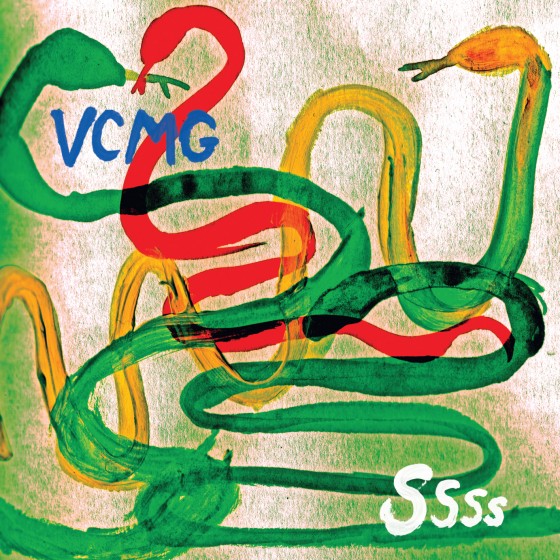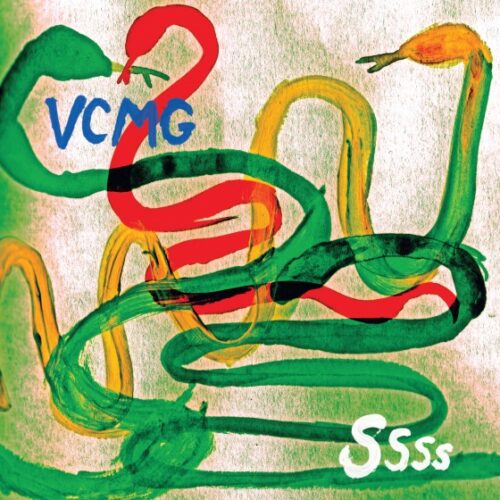I am doing poppers while writing this! No, really I am! Ok, well, perhaps not. But there’s a point 2.29 into ‘Zaat’ when, after an extremely tastefully-executed breakdown the kick returns with mighty force, and I’m having a powerful flashback to Trade, the apogee of sensory deprivation clubbing. It’s 7am, sweat drips from above us like rain and the club is so small, so hot, so dark, so packed with half-naked hedonists (think pretty much every Nitzer Ebb song ever, come to life) that despite the occasional flashes of skin, muscle, the odd drag queen, a particularly rococo facial piercing – it really feels that we can see the music, that the music is the only thing we can perceive, and we’re carried headlong by it, flotsam on a current we couldn’t fight if we wanted to.
VCMG, as you must be aware by now unless you’re living in an anchorite’s cell, is the techno project of Vince Clarke and Martin Gore, their first collaboration since Vince left Depeche Mode after Speak and Spell, thirty-plus years ago. It’s an odd, nostalgic thing, listening to this record – there’s a sense of a lot of things coming full circle, of influence and context and circumstance looping back on themselves in a way that’s deeply satisfying. I can’t be the only person whose love of electronic music of all kinds began with a teenage obsession with Depeche Mode – clanking, scything, lumbering (but still giddily pop) – and the icy, minimal brilliance of Yazoo; mapping a course that leads, inexorably, to dancing in dark clubs to repetitive beats. That SSSS represents – for Depeche Mode fans of a certain age – a kind of Holy Grail, a sort of retro-active Dead Sea Scrolls shouldn’t, however, imply that of itself it is in any way nostalgic, dated, retro – or, indeed, the sound of old men exercising their latest fads. SSSS is a big, dark, riotously enjoyable, thoroughly banging masterpiece that, as with all great music intended for dancing, conjures the pounding, inescapable imperative of NOW. A reminder, if one were needed, that there is there no more gruesome a combination of three words in the language than ‘funky uplifting house,’ SSSS is both joyous and gothic – a Black Celebration, if you will. Nope, couldn’t quite resist that.
If SSSS is on some levels a tip of the hat back in the direction of the techno pioneers on whom Depeche Mode were influential, you have to wonder if Vince asked Martin to get involved in part because to acknowledge that exchange of influence without him would have seemed strange. If techno snobs (yawn) are dubious about two ageing popstars making this kind of music together, they’re missing out – not least because SSSS is as rich and deep as anything by, say, Basic Channel or any of the all-time greats, but also because there’s something in what these two men bring that’s always been a part of techno’s DNA.
That said, the moment opener ‘Lowly’ kicks in, you think – this is a Depeche Mode record in all but name, and – in many ways, pace the absence of Dave Gahan, and despite the necessarily repetitive structures you’d expect from systems music, that’s exactly what it sounds like – with added poppers-rush, look-at-the-lights!, early morning sweat-drenched dance-dive magic. Yes, SSSS is inescapably aimed at the dancefloor, but the melodic sensibility, the wonky metallic noises, the little grace-notes that seemed to disappear from Mode productions after Alan Wilder left but, on this evidence, weren’t solely his preserve – all of these will be familiar to anyone with even a passing acquaintance with Depeche Mode.
There’s certainly a distinctly Mode-ish melancholy in the melodic drive of the second half of ‘Bendy Bass’, which rallies with a deliriously metallic bounce. It’s all I can do to keep my hands on the keyboard and not do the, ahem, ‘classic’ ‘typewriter,’ ‘shopping trolley’ or ‘I’m on the phone’ hand moves. If that makes SSSS sound cheesy, it isn’t: it’s too rigorous and too musical – it doesn’t need to fall back on cheap tricks like washy synth-pad fills and vampish, repetitive breakdowns. Similarly, ‘Single Blip’ has a delirious second half, with irresistibly silly wob-wob-wob bass at 4.05, and there’s a sublime 45 second section from 3.00 of ‘Windup Robot’ (repeated at 4.15) that’s my favourite bit of electronic music for as long as I can remember. Unlike much of the harder end of techno, which is arguably tricky to listen to at home, SSSS is consistently playful, inventive, and yes – as Luke Turner rightly identified, soulful. I started trying to spot which bits might have originated with whom, but it’s a fruitless task – largely because that level of concentration is repeatedly knocked off-balance by the ricochet of another brilliantly bonkers noise across the mix. (Kudos too to Stefan Betke (Pole), whose mastering is not only louder than LOUD, but retains all the depth and detail you’d expect from his own records.)
Even the most enthusiastic reviews of SSSS have tended towards dryness – but this is music that transcends the detached nature of its making. I love that it ticks a lot of boxes that stretch back through my musical education, but not least of its triumphs is that – without context, without history – it is simply fantastic music to dance to. If you’re going to the bar, could you get me a bottle of water? I don’t want to lose my spot on the dancefloor.



